Key takeaways:
- AI enhances personalized medicine by analyzing extensive patient data for better treatment plans and preventive care.
- AI improves diagnostics and predictive analytics, potentially reducing errors and identifying health issues before they escalate.
- Successful AI integration requires addressing skepticism through open discussions, starting small with pilot programs, and ongoing education.
- The future of AI in healthcare promises advancements in personalized medicine and proactive disease management, fostering deeper patient-provider connections.
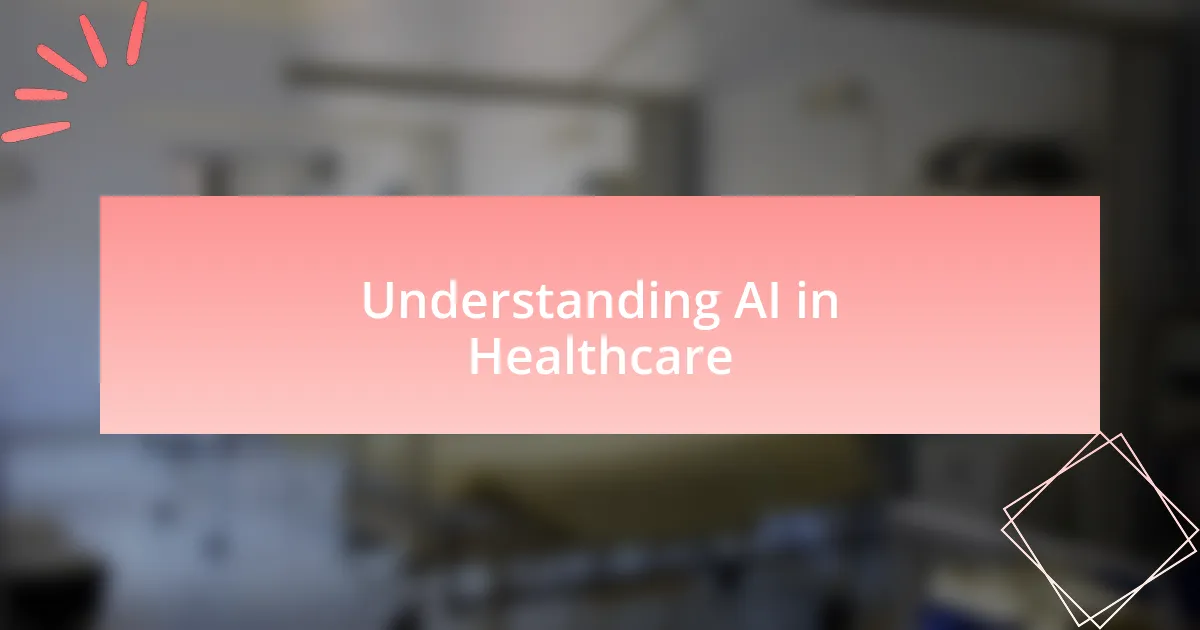
Understanding AI in Healthcare
Artificial Intelligence (AI) is transforming healthcare in ways that extend beyond automation; it’s facilitating personalized medicine by analyzing vast amounts of patient data. I remember the first time I saw AI tools sift through patient records, identifying patterns and suggesting treatment plans. It was like having a co-pilot in the complex airspace of healthcare, where every decision could impact a life.
Consider how AI algorithms can predict patient outcomes based on historical data. Does it sometimes feel overwhelming to think how much potential lies in algorithms that learn and adapt? I’ve been amazed by tools that can flag potential health issues before symptoms even manifest. This predictive power isn’t just innovative; it’s a step toward a proactive healthcare approach that truly focuses on prevention.
Moreover, the application of AI in diagnostics is revolutionary. When I came across a study showing how AI could identify diseases from imaging faster and sometimes more accurately than seasoned radiologists, I couldn’t help but reflect on the implications for reducing diagnostic errors. This isn’t just about technology; it’s about enhancing patient outcomes and fostering a dialogue around trust in AI systems. How can we ensure that while we embrace these advancements, we also maintain the essential human touch in patient care?
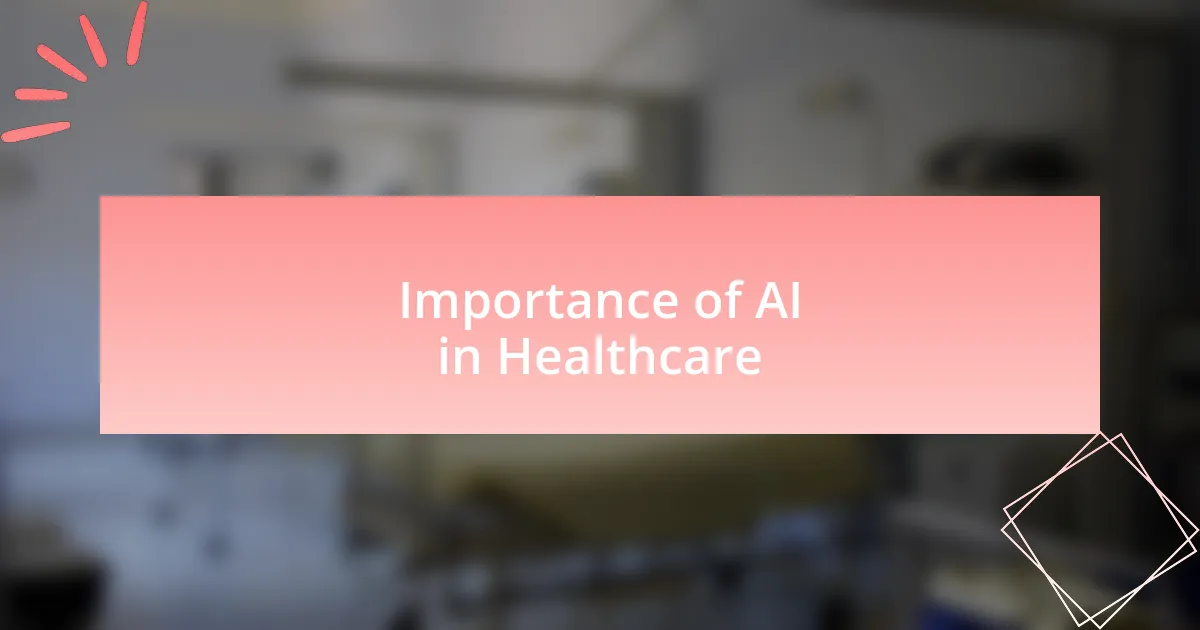
Importance of AI in Healthcare
AI’s role in healthcare cannot be overstated. I remember my first encounter with a virtual triage system that used AI to prioritize patient needs based on urgency. It was astonishing to see how efficiently it directed resources to those in critical condition while easing the load on healthcare professionals. In that moment, I understood that this technology doesn’t just help manage chaos; it brings a level of clarity that benefits both patients and caregivers.
When I think about the intricacies of treatment plans, AI’s capability to analyze diverse datasets is a game-changer. One day, during a meeting, a data analyst showcased how AI could evaluate genetic information alongside lifestyle factors to tailor treatment options. It struck me that this is a profound shift from one-size-fits-all approaches. How many patients could find relief simply because AI can recognize subtle nuances in their health data? The idea that technology can lead to more effective treatments is exhilarating, sparking hope for countless individuals navigating complex medical journeys.
Moreover, the ethical considerations surrounding AI in healthcare are pivotal. During a discussion with fellow professionals, we debated whether the reliance on AI could overshadow patient-provider relationships. While I firmly believe in the benefits of AI, I also cherish the irreplaceable human connection in medicine. Don’t you think we have a responsibility to leverage AI’s strengths while ensuring that empathy remains at the heart of care? Balancing these elements feels crucial as we navigate this brave new world together.
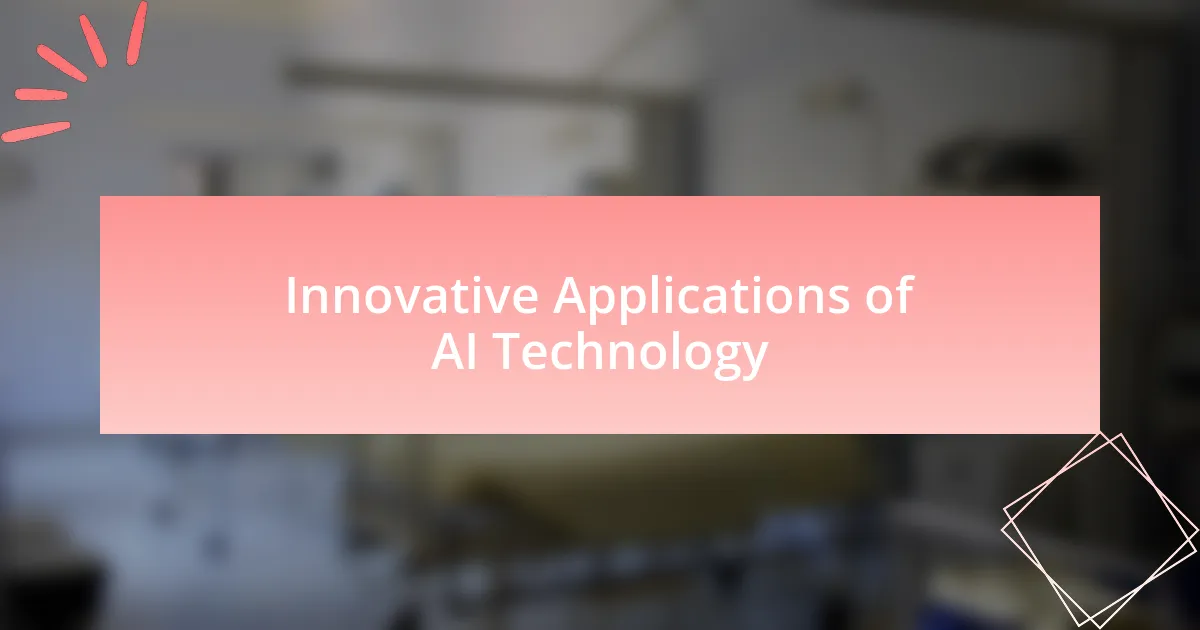
Innovative Applications of AI Technology
AI technology is transforming how diagnoses are made and treatment plans are devised. I recall a vivid moment when a colleague shared a groundbreaking study where an AI program identified patterns in medical imaging that even seasoned radiologists missed. It was eye-opening to realize that this technology not only enhances diagnostic accuracy but also opens doors to earlier interventions. Who wouldn’t feel a sense of relief knowing that a machine can help catch subtle signs of disease before they escalate?
In another instance, I attended a symposium where a developer showcased an AI-powered chatbot designed for mental health support. Hearing testimonials from users who found comfort in this virtual interaction moved me deeply. It reminded me that technology could offer a safe space for those reluctant to seek help in person. Is it not remarkable that AI can provide immediate, accessible support at any hour, bridging a gap for individuals who may otherwise suffer in silence?
I also witnessed a fascinating application of AI in predicting patient outcomes based on treatment adherence. A healthcare provider I spoke with described how an algorithm could flag patients at risk of non-compliance, allowing for timely interventions. It made me ponder: how can we harness this information not only to improve health outcomes but also to foster a greater understanding of individual patient journeys? The potential to personalize care experience is truly inspiring, and it makes me excited to think about what the future holds.
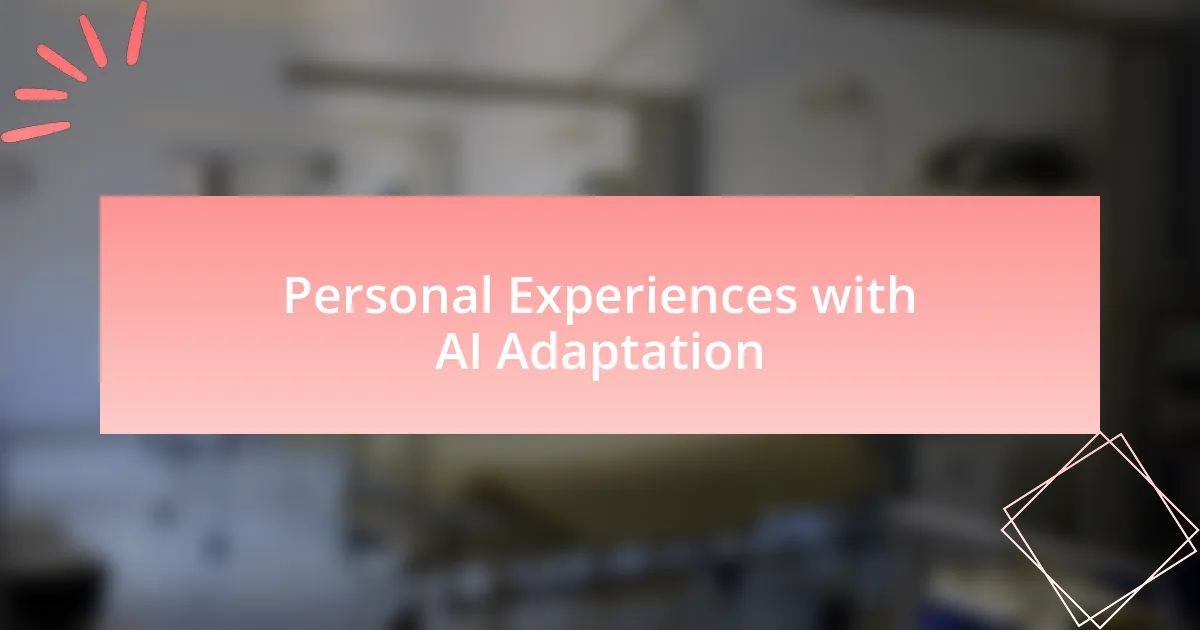
Personal Experiences with AI Adaptation
As I started integrating AI tools into my daily work routine, I initially felt a tinge of apprehension. I remember the first time using a predictive analytics tool to assess patient care pathways; it was transformative. Instead of relying solely on gut instinct and historical data, I found myself making evidence-based decisions that improved patient engagement significantly. The technology seemed daunting at first, but once I embraced it, I realized it could be vital in elevating the standard of care.
One particular experience stands out when I had to adapt to an AI-enhanced scheduling system that streamlined appointment management. I found the transition challenging at first, grappling with new processes and features. However, within weeks, I was relieved to see a notable decrease in scheduling errors. It struck me how this technology not only alleviated workload but also improved patients’ access to care. Reflecting on this experience, I ask myself: how many other areas lie ahead that will benefit from such innovations?
The emotional impact of using AI in our work cannot be underestimated. I recall a moment when an AI-supported decision-making tool provided insights that led me to suggest a critical adjustment in a treatment plan for a patient. Witnessing that patient respond positively left me not just satisfied, but genuinely inspired. It reinforced my belief that while technology may evolve rapidly, the core of healthcare—compassionate, informed patient care—remains steadfast and is enhanced by these innovations in meaningful ways.
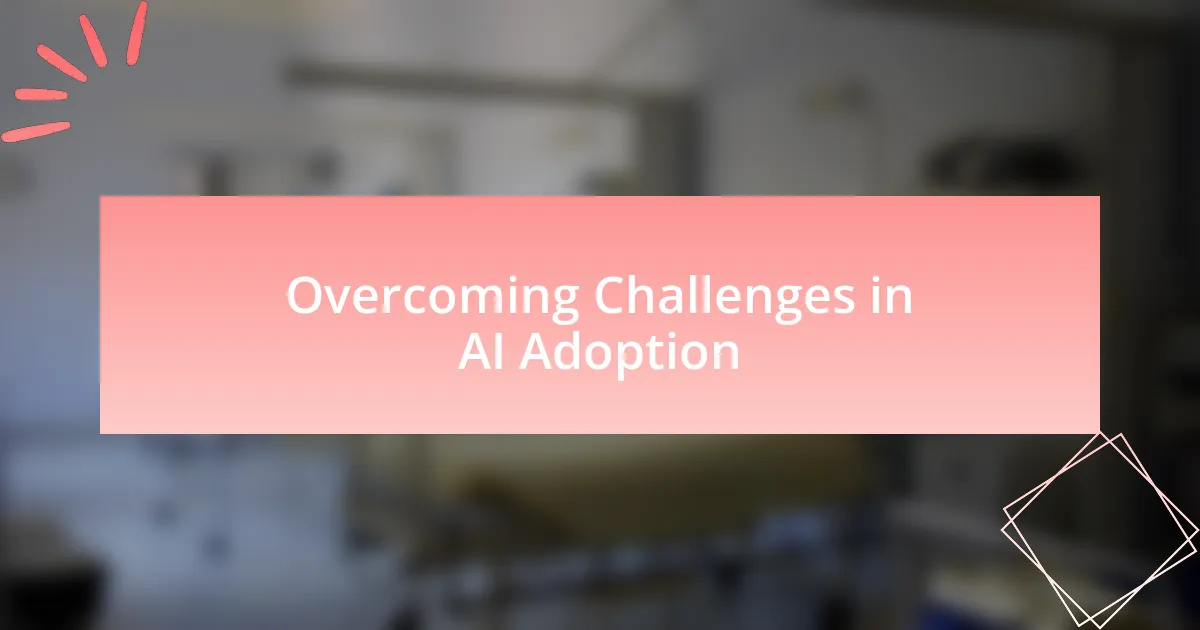
Overcoming Challenges in AI Adoption
Adopting AI in healthcare can feel overwhelming, especially when you face skepticism from peers. I vividly remember pitching an AI tool to my colleagues who were entrenched in traditional practices. Their concerns were valid; integrating AI required a shift in mindset. Yet, it was rewarding to later see how a collaborative approach to training fostered acceptance. Listening to their hesitations and addressing them eased the transition.
Moreover, I encountered technical hurdles that tested my patience. Once, I spent hours troubleshooting a machine learning model that wasn’t yielding expected results. I felt a mix of frustration and doubt. However, persistence proved crucial. I reached out to a supportive online community, learned from their insights, and eventually optimized the tool. This experience taught me that perseverance and a willingness to learn are vital in overcoming the barriers AI adoption often presents.
On a more personal note, the emotional journey of navigating these challenges has been profound. I often reflect on how I felt when I introduced AI to my practice; it was a blend of excitement and trepidation. Facing these challenges head-on not only helped improve patient outcomes but also strengthened my resolve to lead change. What if I hadn’t taken that leap of faith? The thought itself reinforces the immense potential AI holds for revolutionizing our approach to healthcare.

Strategies for Successful AI Integration
Integrating AI into healthcare is more than just a technical upgrade; it’s about reshaping the culture within an organization. I recall a team meeting where I shared my vision for using AI to streamline administrative processes. The initial response was a mix of curiosity and skepticism. Instead of brushing it off, I facilitated open discussions, inviting everyone to voice their concerns. This approach not only helped demystify AI but also built a sense of ownership among my colleagues. Have you ever noticed how collective ownership can lighten the burden of change? That’s the power of inclusion.
Another strategy I found effective was starting small. When I first implemented an AI-driven scheduling tool, I limited it to one department. This pilot program allowed us to gather real-world feedback without overwhelming the staff. Through this phased approach, I was able to refine the tool based on actual user experiences, which made all the difference. It reminded me of how I learned to ride a bike; starting with training wheels helped build my confidence before taking on the open road. Isn’t that the essence of successful integration—transforming uncertainty into confidence?
Lastly, ongoing education and training are crucial for ensuring that everyone is on the same page. I initiated monthly workshops to keep the team updated, using these sessions to share successes and lessons learned. I watched as people transitioned from apprehensive to enthusiastic advocates for AI. It reinforced my belief that knowledge is power—without it, how can we expect to embrace innovation? Engaging in continuous learning not only fosters a supportive environment but also cultivates a culture where adaptation becomes second nature.
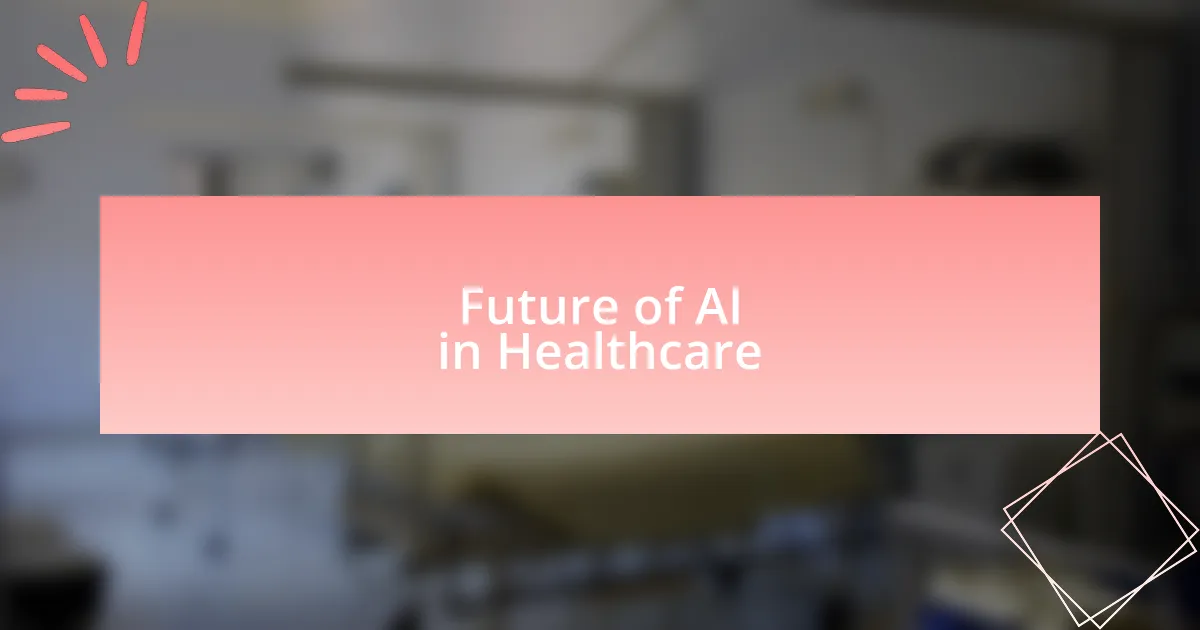
Future of AI in Healthcare
The future of AI in healthcare promises to revolutionize patient care and enhance decision-making. I remember a particular instance where we utilized AI to analyze patient histories, identifying patterns that even seasoned professionals might miss. It was awe-inspiring to see how the algorithm flagged potential health risks before they became critical. Have you ever experienced that moment when data comes alive and tells a story? That’s the kind of transformative potential I foresee for AI.
In addition, I envision AI playing a vital role in personalized medicine, tailoring treatments to individual patient profiles. One time, I was part of a project where an AI tool suggested treatment options based on genetic information. The personalized approach was not only more effective but also made patients feel seen—like their unique stories mattered. Isn’t it powerful to think that technology can cultivate a deeper connection between caregivers and patients?
Moreover, AI-driven predictive analytics could be game-changing, especially in anticipating outbreaks or managing resource allocation. Reflecting on our team’s reaction as we harnessed AI for predictive modeling was enlightening. The initial reluctance transformed into excitement as we realized how much better we could respond to healthcare challenges. How can we not feel a spark of hope knowing that AI could potentially save lives before threats are even detected? I genuinely believe that embracing AI in healthcare will lead us into an era of unprecedented innovation and compassion.